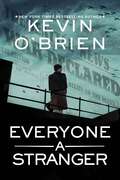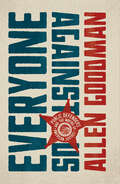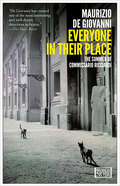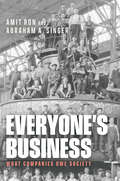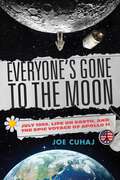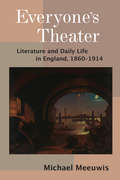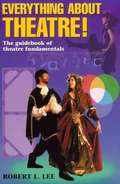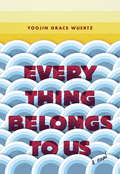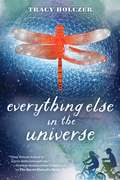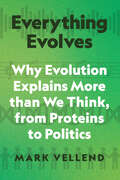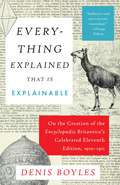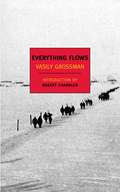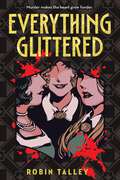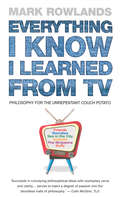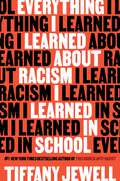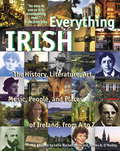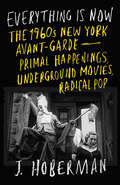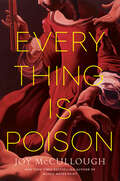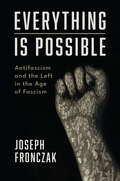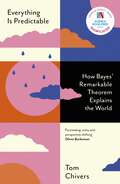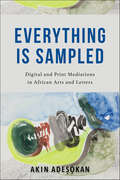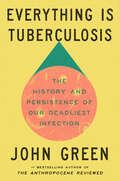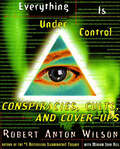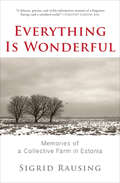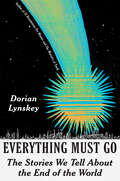- Table View
- List View
Everyone a Stranger
by Kevin O'BrienA young war widow is unwittingly drawn into a sinister web of intrigue and murder in this taut, unexpected, masterfully plotted historical thriller set in WWII-era Seattle, where the enemy may be closer than anyone thinks. A crafty, addictive read for fans of The Americans, Anna Pitoniak, Graham Moore, and Elizabeth Wein.&“A page-turning masterclass in storytelling— historically captivating, emotionally rich, and crackling with slow-burn menace.&” – JAMIE FORD, New York Times bestselling author of The Many Daughters of Afong MoyWashington D.C., 1943: Virginia Abrams believed the war had taken all it could from her when her husband was killed at Guadalcanal. One year later, she&’s in a dark, unexpected quandary—pregnant and on the run to avoid a ruthless political family that wants to erase all connections between her and the man who assaulted her. Changing her name, Virginia moves to Seattle to start over. Against her better instincts, she&’s pulled into the lives of her new neighbors in an apartment complex—especially Tim, a young boy whose mother dies suddenly in a fall. Virginia fears that her whereabouts have been discovered, and she was the intended target . . . But there are secrets between the residents too—stormy affairs, mysterious visitors, whispers and rumors. Tim is convinced there are saboteurs among them, hiding in plain sight. Virginia wants to discount his teenage imagination and her own rising paranoia, yet there&’s something menacing here . . . Torn between wanting to help the boy and safeguarding her anonymity, Virginia tentatively begins piecing the puzzle together with the help of some of her neighbors. But now others are dying in an escalating series of &“accidents.&” No one is entirely who they seem to be. No one can be trusted. And though she doesn&’t know it yet, her own life is hanging by the thinnest thread . . .&“I gobbled up Everyone a Stranger, with its ever-expanding sense of danger, its cool evocation of 1940s Seattle, and its indelible cast of characters—both shady and smart.&” – JESS WALTER, # 1 New York Times bestselling author of The Cold Millions
Everyone against Us: Public Defenders and the Making of American Justice (Chicago Visions and Revisions)
by Allen GoodmanA former public defender testifies to the vivid human suffering at the heart of America’s criminal justice system. As a public defender, Allen Goodman faced cross-examination from family and friends every day: How could he work to help criminals? How could he live with himself? Presumed guilty by association, Goodman quickly learned that people didn’t really want an answer; they wanted a justification, perhaps even an apology. Ever the idealist, Goodman answered anyway: Everyone deserves justice. Everyone against Us is Goodman’s testimony of his life as a public defender. In it, he documents his efforts to defend clients, both guilty and innocent, against routine police abuse, prosecutorial misconduct, and unjust sentencing. To work in criminal justice, Goodman shows, is to confront and combat vivid human suffering, of both victims and perpetrators. From sex trafficking, murder, and abuse to false conviction, torture, and systemic racism, Goodman describes the daily experiences that both rattled his worldview and motivated him to work ever harder. Part memoir, part exposé, Everyone against Us is the moving story of an embattled civil servant who staves off the worst abuses of the criminal justice system, at great personal cost.
Everyone in Their Place: The Summer of Commissario Ricciardi (The Commissario Ricciardi Mysteries #3)
by Maurizio de GiovanniThird in “a superb historical series set in Fascist Italy . . . and featuring one of the most melancholy detectives in European noir crime fiction (The New York Times Book Review).Commissario Ricciardi has visions. He sees and hears the final seconds in the lives of victims of violent deaths. It is both a gift and a curse. It has helped him become one of the most acute and successful homicide detectives in the Naples police force. But the horror and suffering he has seen has hollowed him out emotionally. He drinks too much and sleeps too little. His love life is a shamble. Other than his loyal partner, Brigadier Maione, he has no friends.Naples, 1931. Together with Brigadier Maione, Ricciardi is investigating the death of the beautiful and mysterious Duchess of Camparino, whose connections to privileged Neapolitan social circles and the local fascist elite make the case a powder keg waiting to explode. As Benito Mussolini’s state visit to Naples looms and authorities frantically seek to clean up the city’s image, Ricciardi will stop at nothing to find the duchess’s killer.“Reading a novel by Maurizio de Giovanni is like stepping into a Vittorio De Sica movie. The sights and smells of Naples are pungently evoked.” —The New York Times Book Review“Combines a rare setting for a whodunit, Fascist Italy, with a classic fair-play puzzle and a highly unusual lead . . . a lyrical and tantalizing opening . . . intriguing.” —Publishers Weekly (starred review)“In the popular field of historical noir featuring gloomy but brilliant detectives, de Giovanni’s series easily stands out as a success.” —Library Journal (starred review)
Everyone's Business: What Companies Owe Society
by Amit Ron Abraham A. SingerBusiness is political. What are the ethics of it? Businesses are political actors. They not only fund political campaigns, take stances on social issues, and wave the flags of identity groups – they also affect politics in their everyday hiring and investment decisions. As a highly polarized public demands political alignment from the powerful businesses they deal with, what’s a company to do? Amit Ron and Abraham Singer show that the unavoidably political role of companies in modern life is both the fundamental problem and inescapable fact of business ethics: corporate power makes business ethics necessary, and business ethics must strive to mitigate corporate power. Because of its economic and social influence, Ron and Singer forcefully argue that modern business’s primary social responsibility is to democracy. Businesses must work to avoid wielding their power in ways that undermine key democratic practices like elections, public debate, and social movements. Pragmatic and urgent, Everyone’s Business offers an essential new framework for how we pursue profit—and democracy—in our increasingly divided world.
Everyone's Gone to the Moon: July 1969, Life on Earth, and the Epic Voyage of Apollo 11
by Joe CuhajMuch has been written about the legendary flight of Apollo 11 and mankind&’s first tentative steps into deep space. It&’s often said that the world stopped, watching in awe as the crew of Apollo 11 completed their mission. It is true that in that moment, almost everyone had virtually gone to the moon as people around the world gazed in wonderment at the grainy black-and-white images of Neil Armstrong taking that first step onto the surface of another world. But that was a fleeting moment and just as quickly, the moment was gone– wars raged on, protestors filled the streets, and average Americans went back to their daily lives. Everyone&’s Gone to the Moon is a week-by-week journey through July 1969, one of the most pivotal months in human history – in space and here on Earth. This unique book follows the crew of Apollo 11 and NASA as they prepare for the historic first lunar landing alongside the major global events buried beneath headlines covering the historic space mission. Interwoven with the story of Apollo 11 are the events on our home planet that made an equally important impact on who we were then and who we are today: the Life of Prince Charles was threatened by a terrorist attack in Wales; the storm dubbed the Ohio Fireworks Derecho ripped through the Midwest, killing dozens; the assassination of Kenyan Economic Minister Tom Myoba (of which Barack Obama Sr. was a key witness) undercut a nation just learning to stand on its own; Senator Ted Kennedy was involved in a mysterious accident in Chappaquiddick, Massachusetts; ARPANET, the first real &“Internet&” was unveiled; Monty Python was born; John Lennon and Paul McCartney released &“Give Peace a Chance&” during escalated Vietnam War tensions; Midnight Cowboy stunned the Academy Awards; and much more. Meanwhile, NASA was still scrambling. Everyone&’s Gone to the Moon features little known behind-the-scenes stories of the moon landing like how NASA had to grapple with media, the technical issues that still plagued the lunar module, and how the prior crew of Apollo 10 suffered incredible itching from their spacesuits that needed correcting before Apollo 11 could even be launched. This deep dive into the Apollo 11 mission&’s most crucial weeks and the little-known and rarely remembered events occurring simultaneously back on Earth gives a vivid new perspective to the month that launched humanity into the future. ,
Everyone’s Theater: Literature and Daily Life in England, 1860–1914
by Michael MeeuwisNearly all residents of England and its colonies between 1860 and 1914 were active theatergoers, and many participated in the amateur theatricals that defined late Victorian life. The Victorian theater was not an abstract figuration of the world as a stage, but a media system enmeshed in mass lived experience that fulfilled in actuality the concept of a theatergoing nation. Everyone’s Theater turns to local history, the words of everyday Victorians found in their diaries and production records, to recover this lost chapter of theater history in which amateur drama domesticates the stage. Professional actors and playwrights struggled to make their productions compatible with ideas and techniques that could be safely reproduced in the home—and in amateur performances from Canada to India. This became the first true English national theater: a society whose myriad classes found common ground in theatrical display. Everyone’s Theater provides new ways to extend Victorian literature into the dimension of voice, sound, and embodiment, and to appreciate the pleasures of Victorian theatricality.
Everything About Theatre!: The Guidebook Of Theatre Fundamentals
by Robert L. Lee Theodore O. ZapelAn overview of all aspects of theatre The history, the crafts and the art of the stage are presented in eighteen units.
Everything Belongs to Us: A Novel
by Yoojin Grace WuertzTwo young women of vastly different means each struggle to find her own way during the darkest hours of South Korea’s “economic miracle” in a striking debut novel for readers of Anthony Marra and Chimamanda Ngozie Adichie. Seoul, 1978. At South Korea’s top university, the nation’s best and brightest compete to join the professional elite of an authoritarian regime. Success could lead to a life of rarefied privilege and wealth; failure means being left irrevocably behind. For childhood friends Jisun and Namin, the stakes couldn’t be more different. Jisun, the daughter of a powerful business mogul, grew up on a mountainside estate with lush gardens and a dedicated chauffeur. Namin’s parents run a tented food cart from dawn to curfew; her sister works in a shoe factory. Now Jisun wants as little to do with her father’s world as possible, abandoning her schoolwork in favor of the underground activist movement, while Namin studies tirelessly in the service of one goal: to launch herself and her family out of poverty. But everything changes when Jisun and Namin meet an ambitious, charming student named Sunam, whose need to please his family has led him to a prestigious club: the Circle. Under the influence of his mentor, Juno, a manipulative social climber, Sunam becomes entangled with both women, as they all make choices that will change their lives forever. In this sweeping yet intimate debut, Yoojin Grace Wuertz details four intertwining lives that are rife with turmoil and desire, private anxieties and public betrayals, dashed hopes and broken dreams—while a nation moves toward prosperity at any cost. Praise for Everything Belongs to Us“Engrossing. [Yoojin Grace] Wuertz is an important new voice in American fiction.”—Kirkus, starred review “[A] memorable debut . . . Wuertz crafts a story with delicious scenes and plot threads.”—Publishers Weekly “An absorbing debut destined for major lists and nominations.”—Booklist"In Everything Belongs to Us, Wuertz has given us a Middlemarch for modern South Korea. She’s woven the whole social tapestry, and made us care about every last thread.”—Susan Choi, author of My Education “I found myself engrossed in the difficult choices faced by Wuertz’s nuanced, engaging characters as they navigate college politics and romance in 1970s Seoul. I’m thrilled to have experienced their inner lives in these pages—to have celebrated their victories and commiserated in the pain of their mistakes—and would happily have stuck with them for hundreds more.”—Emily Barton, author of The Book of Esther “What a story! Everything belongs to this terrific debut: love, family, friendship, and politics. I especially loved the two strong-willed and passionate heroines. Their ideals, choices, and struggles make this an utterly rapturous literary page-turner.”—Samuel Park, author of This Burns My Heart “Historic in scope yet eerily contemporary, Everything Belongs to Us is a stirring debut that immerses readers in a society where some quietly hope for change and others must demand it. In Yoojin Grace Wuertz’s capable hands, characters come alive with desire for a different kind of life, and heartbreak is the price of longing.”—Jung Yun, author of Shelter
Everything Else in the Universe
by Tracy HolczerIn the midst of the Vietnam War, a young girl struggles to embrace change in this tender family story for fans of Cynthia Lord and Wendy MaasLucy is a practical, orderly person--just like her dad. He taught her to appreciate reason and good sense, instilling in her the same values he learned at medical school. But when he's sent to Vietnam to serve as an Army doctor, Lucy and her mother are forced to move to San Jose, California, to be near their relatives--the Rossis--people known for their superstitions and all around quirky ways. Lucy can't wait for life to go back to normal, so she's over the moon when she learns her father is coming home early. It doesn't even matter that he's coming back "different." That she can't ask too many questions or use the word "amputation." It just matters that he'll be home. But Lucy quickly realizes there's something very wrong when her mother sends her to spend the summer with the Rossis to give her father some space. Lucy's beside herself, but what's a twelve-year-old to do? It's a curious boy named Milo, a mysterious packet of photographs and an eye-opening mission that makes Lucy see there's more to life than schedules and plans, and helps to heal her broken family. The latest from critically-acclaimed author Tracy Holczer is a pitch-perfect middle grade tale of family and friendship that's sure to delight fans of One for the Murphys and Rules.
Everything Evolves: Why Evolution Explains More than We Think, from Proteins to Politics
by Mark VellendHow the science of evolution explains how everything came to be, from bacteria and blue whales to cell phones, cities, and artificial intelligenceEverything Evolves reveals how evolutionary dynamics shape the world as we know it and how we are harnessing the principles of evolution in pursuit of many goals, such as increasing the global food supply and creating artificial intelligence capable of evolving its own solutions to thorny problems.Taking readers on an astonishing journey, Mark Vellend describes how all observable phenomena in the universe can be understood through two sciences. The first is physics. The second is the science of evolvable systems. Vellend shows how this Second Science unifies biology and culture and how evolution gives rise to everything from viruses and giraffes to nation-states, technology, and us. He discusses how the idea of evolution had precedents in areas such as language and economics long before it was made famous by Darwin, and how only by freeing ourselves of the notion that the study of evolution must start with biology can we appreciate the true breadth of evolutionary processes.A sweeping tour of the natural and social sciences, Everything Evolves is an essential introduction to one of the two key pillars to the scientific enterprise and an indispensable guide to understanding some of the most difficult challenges of the Anthropocene.
Everything Explained That Is Explainable: On the Creation of the Encyclopaedia Britannica's Celebrated Eleventh Edition, 1910-1911
by Denis BoylesThe publication of the Eleventh Edition of the Encyclopædia Britannica in 1911 marked the last stand of the Enlightenment and a turbulent end to an era. The Eleventh Edition summed up the high point of optimism and belief in human progress that dominated Anglo-Saxon thought from the time of the Enlightenment. Eagerly embraced by hundreds of thousands of middle-class Americans, the Eleventh Edition was read as a twenty-nine-volume anthology of some of the best essays written in English. Among the names of those who contributed to its volumes: T. H. Huxley, Algernon Swinburne, Bertrand Russell; it was the work of 1,500 eminent contributors and was edited by Hugh Chisholm, charismatic star editor. The Britannica combined scholarship and readability in a way no previous encyclopedia had or ever has again. Within less than a decade after its publication, the Edwardian worldview was at an end: the "unsinkable" White Star Titanic had sunk on its maiden voyage; Archduke Franz Ferdinand was assassinated and the Great War had begun. In Everything Explained That Is Explainable, Denis Boyles tells the audacious, improbable story of twentieth-century American hucksterism and vision that resurrected a dying Encyclopædia Britannica by means of a floundering London Times, and writes of how its astonishing success changed publishing and produced the Britannica's Eleventh Edition, still the most revered--all 44 million words--of English-language encyclopedias, considered by many to be the last great work of the age of reason.The author writes of the man whose inspiration it was: Horace Everett Hooper, American entrepreneur who stumbled into the book business at sixteen on a hunch that he could make money selling inexpensive editions of classics by direct mail to isolated settlers scattered across the American West. Hooper found an outdated set of reference books gathering dust in a warehouse, bought them for almost nothing, repackaged them, and sold them on credit as "one-shelf libraries" to farmers concerned about their children's education in frontier schools; his Western Book and Stationery Company became one of the largest publishers in the Midwest, sending books directly to readers, bypassing traditional booksellers, and inventing a model that was forever after emulated . . . Boyles writes that Hooper and his partner, Henry Haxton, a former Hearst reporter and ingenious adman, came across the Encyclopædia Britannica, published by Adam & Charles Black, whose Ninth Edition's final volume, published in 1890, was seen by many as the height of English intellectual achievement. The Ninth had everything an encyclopedia needed. Except readers. Hooper and Haxton came up with a new market for the encyclopedia's next two editions, which they planned to produce, and approached the then-struggling London Times, which became their publishing partner.Boyles tells the outlandish, bumpy tale of the making of the Eleventh; of the young staff of university graduates working with fanatical conviction (40,000 entries by 1,500-odd contributors), scattered around the globe . . . more than 200 members of the Royal Society or fellows of the British Academy; diplomats; government officials; officers of learned societies . . . contributions by the most admired writers, thinkers, and scientists of the day; of their scheme to sell the Eleventh Edition and of the storm that erupted around its publication--and after.An extraordinary tale of American know-how, enterprise, and spirit.From the Hardcover edition.
Everything Flows
by Robert Chandler Elizabeth Chandler Vasily Grossman Anna AslanyanA New York Review Books Original. Everything Flows is Vasily Grossman's final testament, written after the Soviet authorities suppressed his masterpiece, Life and Fate. The main story is simple: released after thirty years in the Soviet camps, Ivan Grigoryevich must struggle to find a place for himself in an unfamiliar world. But in a novel that seeks to take in the whole tragedy of Soviet history, Ivan's story is only one among many. Thus we also hear about Ivan's cousin, Nikolay, a scientist who never let his conscience interfere with his career, and Pinegin, the informer who got Ivan sent to the camps. Then a brilliant short play interrupts the narrative: a series of informers steps forward, each making excuses for the inexcusable things that he did--inexcusable and yet, the informers plead, in Stalinist Russia understandable, almost unavoidable. And at the core of the book, we find the story of Anna Sergeyevna, Ivan's lover, who tells about her eager involvement as an activist in the Terror famine of 1932-33, which led to the deaths of three to five million Ukrainian peasants. Here Everything Flows attains an unbearable lucidity comparable to the last cantos of Dante's Inferno.
Everything Glittered
by Robin TalleyIn this queer historical thriller from a New York Times bestselling author, society girls try to find a murderer in a city filled with secrets and stunted by shame. Perfect for fans of Last Night at the Telegraph Club. It&’s 1927 and the strict laws of prohibition have done little to temper the roaring 20s nightlife, even in the nation&’s capitol. Everyone knows the booze has never stopped flowing, especially amongst the rich and powerful, and seventeen-year-old Gertrude and her best friends Clara and Milly are determined to get a taste of freedom and liquor, propriety be damned. But after sneaking out of the Washington Female Seminary to visit a speakeasy, they return to discover that their controversial young headmistress, Mrs. Rose, has been murdered. Reeling from the death of her beloved mentor, Gertrude enlists her friends in her quest to clear Mrs. Rose&’s reputation, while trying to keep her own intact. But in Prohibition Washington, it&’s difficult to sidestep grifters, bootleggers, and shady federal agents when investigating a murder. And with all the secrets being uncovered, Gertrude is finding it harder and harder to keep her attraction to her best friends hidden. A proper, upscale life is all Gertrude has ever known, but murder sure makes a gal wonder: is all that glitters really gold?
Everything I Know I Learned From TV: Philosophy For the Unrepentant Couch Potato
by Mark RowlandsEverything I Know I Learned From TV uses characters we all know and love and their TV worlds to explain the great questions of philosophy. The only qualifications you need to join in are ownership of a sofa, a remote control, a sense of humour and an enquiring mind. The philosophy discussed is very much 'life' philosophy, answering the questions we all want to know: How do you define what is a good life to lead? The Simpsons disagree over the right way to live with Nietzsche and Diogenes on hand to take sides. What is real happiness? Aristotle fights Descartes for the heart and mind of Sex and the City's Carrie Bradshaw. Can a good person do a bad thing? Kant and Socrates pay a call on Tony Soprano and his latter-day Mob to talk moral philosophy. Where does love end and friendship begin? Rachel and Ross ask Plato about the philosophy of emotions and wonder if they're just good friends. Is the pursuit of self-knowledge a good thing? Socrates helps Niles and Frasier Crane and their dad deal with the relative merit of the examined and the unexamined life. And much more.
Everything I Learned About Racism I Learned in School
by Tiffany JewellFrom the #1 New York Times bestselling author of This Book Is Anti-Racist and The Antiracist Kid, Tiffany Jewell, this YA nonfiction book, highlighting inequities Black and Brown students face from preschool through college, is the most important, empowering read this year.From preschool to higher education and everything in between, Everything I Learned About Racism I Learned in School focuses on the experiences Black and Brown students face as a direct result of the racism built into schools across the United States.The overarching nonfiction narrative follows author Tiffany Jewell from early elementary school through her time at college, unpacking the history of systemic racism in the American educational system along the way. Throughout the book, other writers of the global majority share a wide variety of personal narratives and stories based on their own school experiences.Contributors include New York Times bestseller Joanna Ho; award winners Minh Lê, Randy Ribay, and Torrey Maldonado; authors James Bird and Rebekah Borucki; author-educators Amelia A. Sherwood, Roberto Germán, Liz Kleinrock, Gary R. Gray Jr., Lorena Germán, Patrick Harris II, shea wesley martin, David Ryan Barcega Castro-Harris, Ozy Aloziem, Gayatri Sethi, and Dulce-Marie Flecha; and even a couple of teen writers!Everything I Learned About Racism I Learned in School provides young folks with the context to think critically about and chart their own course through their current schooling—and any future schooling they may pursue.
Everything Irish: The History, Literature, Art, Music, People, and Places of Ireland from A to Z
by Lelia Ruckenstein James A. O'MalleyHere, in one complete volume, is the depth and breadth of the great island nation and its people represented in an easily browsed, friendly format. From the Abbey Theatre to the Dublin storyteller Zozimus; from the origin of the Troubles to the origin of the limerick; from the stunning beauty of Connemara to the shattering tragedy of Bloody Sunday; from the greatest writers of the English language to the "confrontational television" of Gay Byrne's The Late Late Show-every aspect of Irish culture, geography, and history is collected and annotated in more than 900 entries from A to Z. Readers will encounter heroes and terrorists, poets and politicians, all of Ireland's counties, ancient myths, and pivotal events--all expertly and succinctly described and explained. With entries written by some of the world's leading authorities on Ireland,Everything Irish is perfect for everyone, from the inquiring reader to the serious student. You can spend a few minutes learning about the much-maligned Travelers and then move on to the equally contentious (in its time) medieval tithe. Visit the majestic Cliffs of Moher and then delve into an analysis of paramilitary groups like the Irish Republican Army and the Ulster Volunteer Force. Explore the ruins of a Romanesque castle or experience the piercing light of the winter solstice inside prehistoric Newgrange, a passage grave older than the pyramids. Across centuries and across counties, the rich landscape of Irish life and heritage springs to life in these pages. An indispensable source of fascinating information and captivating anecdote, this is one book that will never be far from the hands of those with curious minds or an adventurous spirit.
Everything Is Now: The 1960s New York Avant-Garde Primal Happenings, Underground Movies, Radical Pop
by J HobermanA groundbreaking cultural history of 1960s New York, from the legendary writer on art and filmLike Paris in the 1920s, New York City in the 1960s was a cauldron of avant-garde ferment and artistic innovation. Boundaries were transgressed and new forms created. Drawing on interviews, memoirs, and the alternative press, Everything Is Now chronicles this collective drama as it was played out in coffeehouses, bars, lofts, storefront theaters, and, ultimately, the streets.The principals here are penniless filmmakers, jazz musicians, and performing poets, as well as less classifiable artists. Most were outsiders at the time. They include Amiri Baraka, Bob Dylan, Allen Ginsberg, Yayoi Kusama, Yoko Ono, Nam June Paik, Carolee Schneemann, Jack Smith, Andy Warhol, and many more. Some were associated with specific movements (Avant Rock, Destruction Art, Fluxus, Free Jazz, Guerrilla Theater, Happenings, Mimeographed Zines, Pop Art, Protest-Folk, Ridiculous Theater, Stand-Up Poetry, Underground Comix, and Underground Movies). But there were also movements of one. Their art, rooted in the detritus and excitement of urban life, was taboo-breaking and confrontational.As J. Hoberman shows in this riveting history, these subcultures coalesced into a counterculture that changed the city, the country, and the world.
Everything Is Poison
by Joy McCulloughThis historical novel in prose and verse tells the story of a deadly secret hiding in plain sight and of the women who risk everything to provide care for those with nowhere else to turn, perfect for fans of Blood Water Paint and The Lost Apothecary. Early Seventeenth-Century RomeFor as long as she can remember, Carmela Tofana has desperately wanted one thing: to be allowed behind the counter of her mother&’s apothecary in Campo Marzio, Rome. When she turns sixteen, she&’s finally allowed into the inner sanctum: the workroom where her mother, Giulia Tofana, and two assistants craft renowned remedies for their customers. But for every sweet-smelling flower extract in the workroom, there&’s another potion requiring darker ingredients. And then there&’s Aqua Tofana, the apothecary&’s remedy of last resort for husbands who are just as deadly as any disease. In all Carmela&’s years of wishing to follow in her mother&’s footsteps, she never realized one tiny vial could be the death of them all.
Everything Is Possible: Antifascism and the Left in the Age of Fascism
by Joseph FronczakThe fascinating history of how the antifascist movement of the 1930s created “the left” as we know it today In the middle years of the Great Depression, the antifascist movement became a global political force, powerfully uniting people from across divisions of ideology, geography, race, language, and nationality. Joseph Fronczak shows how socialists, liberals, communists, anarchists, and others achieved a semblance of unity in the fight against fascism. Depression-era antifascists were populist, militant, and internationalist. They understood fascism in global terms, and they were determined to fight it on local terms. In the United States, antifascists fought against fascism on the streets of cities such as Chicago and New York, and they connected their own fights to the ones raging in Germany, Italy, and Spain. As he traces the global trajectory of the antifascist movement, Fronczak argues that its most significant legacy is its creation of “the left” as we know it today: an international conglomeration of people committed to a shared politics of solidarity.
Everything Is Predictable: How Bayes' Remarkable Theorem Explains the World
by Tom ChiversThomas Bayes was an eighteenth-century Presbyterian minister and amateur mathematician whose obscure life belied the profound impact of his work. Like most research into probability at the time, his theorem was mainly seen as relevant to games of chance, like dice and cards. But its implications soon became clear. Bayes' theorem helps explain why highly accurate screening tests can lead to false positives, causing unnecessary anxiety for patients. A failure to account for it in court has put innocent people in jail. But its influence goes far beyond practical applications. A cornerstone of rational thought, Bayesian principles are used in modelling and forecasting. 'Superforecasters', a group of expert predictors who outperform CIA analysts, use a Bayesian approach. And many argue that Bayes' theorem is not just a useful tool, but a description of almost everything - that it is the underlying architecture of rationality, and of the human brain. Fusing biography, razor-sharp science communication and intellectual history, Everything Is Predictable is a captivating tour of Bayes' theorem and its impact on modern life. From medical testing to artificial intelligence, Tom Chivers shows how a single compelling idea can have far-reaching consequences.
Everything Is Sampled: Digital and Print Mediations in African Arts and Letters
by Akin AdesokanEverything Is Sampled examines the shifting modes of production and circulation of African artistic forms since the 1980s, focusing on digital culture as the most currently decisive setting for these changes. Drawing on works of cinema, literature, music, and visual art, Akin Adesokan. addresses two main questions. First, given the various changes that the institutions producing African arts and letters have undergone in the past four decades, how have the representational impulses in these forms fared in comparison with those at work in pervasively digital cultures? Second, how might a long view of these artistic forms across media and in different settings affect our understanding of what counts as art, as text, as authorship? Immersed in digital culture, African artists today are acutely aware of the media-saturated circumstances in which they work and actively bridge them by making ethical choices to shape those circumstances. Through an innovative development and analysis of five modes of creative practice—curation, composition, adaptation, platform, and remix—Everything Is Sampled offers an absorbingly complex yet nuanced approach to appreciating the work of several generations of African writers, directors, and artists. No longer content to just fill a spot in the relay between the conception and distribution of a work, these artists are now also quick to view and reconfigure their works through different modes of creative practice.
Everything Is Tuberculosis: The History and Persistence of Our Deadliest Infection
by John GreenJohn Green, the #1 bestselling author of The Anthropocene Reviewed and a passionate advocate for global healthcare reform, tells a deeply human story illuminating the fight against the world’s deadliest infectious disease. <p> “This highly readable call to action could not be more timely.” –Kirkus, starred review. <p> “Memorably probes the intersections of medicine and human emotion.” –Bookpage, starred review. <p> Tuberculosis has been entwined with humanity for millennia. Once romanticized as a malady of poets, today tuberculosis is seen as a disease of poverty that walks the trails of injustice and inequity we blazed for it. In 2019, author John Green met Henry Reider, a young tuberculosis patient at Lakka Government Hospital in Sierra Leone. John became fast friends with Henry, a boy with spindly legs and a big, goofy smile. In the years since that first visit to Lakka, Green has become a vocal advocate for increased access to treatment and wider awareness of the healthcare inequities that allow this curable, preventable infectious disease to also be the deadliest, killing over a million people every year. <p> In Everything Is Tuberculosis, John tells Henry’s story, woven through with the scientific and social histories of how tuberculosis has shaped our world—and how our choices will shape the future of tuberculosis. <b>New York Times Bestseller</b>
Everything Is Under Control: Conspiracies, Cults, and Cover-ups
by Robert Anton Wilson Miriam Joan HillEverything Is under Control is Wilson's -to-Z of conspiracy theories-real, half-real and completely imaginary. Highly cross-referenced and written in a journalistic tone, it ioncludes fascinating information on Area 51, the Bermuda Triangle, Naom Chomsky, Crying of Lot 49, "Bob" Dobbs, Elders of Zion, the federal reserve, Holocaust deniers, Iran-Contra, JFK, Knights Templar, McCarthy, Norplant, Operation Mind Control, Pearl Harbor, UFO Abductiion, Wicca, and more.
Everything Is Wonderful: Memories of a Collective Farm in Estonia
by Sigrid Rausing&“Pages of dreamlike prose explore Estonia&’s terrible Nazi-Soviet past, the trauma of dictatorship, and how memory processes that trauma.&” —The Financial Times A Times Literary Supplement Best Book of the Year Just like it was taken for granted that houses could be abandoned and slowly decay, so it was taken for granted that people died in prisons, and that it was possible that no-one would really ever know the cause of death. This is the nature of totalitarianism . . . In the early 1990s, after the collapse of the USSR, Sigrid Rausing completed her anthropological fieldwork on the peninsula of Noarootsi, a former Soviet border protection zone in Estonia. Abandoned watch towers dotted the coast line, and the huge fields of the Lenin collective farm were lying fallow, waiting for claims from former owners who had fled war and Soviet and Nazi occupation. Rausing&’s conversations with the local people touched on many subjects: the economic privations of post-Soviet existence, the bewildering influx of western products, and the Swedish background of many of them. In Everything Is Wonderful Rausing reflects on history, political repression, and the story of the minority Swedes in the area. Here she tells her story of what she observed as she lived and worked among the villagers—witnessing their transition from repression to freedom, and from Soviet neglect to post-Soviet austerity. &“A delicate, precise, and richly informative memoir of a forgotten Europe and a vanished world.&” —Timothy Garton Ash
Everything Must Go: The Stories We Tell About the End of the World
by Dorian LynskeyA rich, captivating, and darkly humorous look into the evolution of apocalyptic thought, exploring how film and literature interact with developments in science, politics, and culture, and what factors drive our perennial obsession with the end of the world.As Dorian Lynskey writes, &“People have been contemplating the end of the world for millennia.&” In this immersive and compelling cultural history, Lynskey reveals how religious prophecies of the apocalypse were secularized in the early 19th century by Lord Byron and Mary Shelley in a time of dramatic social upheaval and temporary climate change, inciting a long tradition of visions of the end without gods.With a discerning eye and acerbic wit, Lynskey examines how various doomsday tropes and predictions in literature, art, music, and film have arisen from contemporary anxieties, whether they be comets, pandemics, world wars, the Cuban Missile Crisis, Y2K, or the climate emergency. Far from being grim, Lynskey guides readers through a rich array of fascinating stories and surprising facts, allowing us to keep company with celebrated works of art and the people who made them, from H.G. Wells, Jack London, W.B. Yeats and J.G. Ballard to The Twilight Zone, Dr. Strangelove, Mad Max and The Terminator.Prescient and original, Everything Must Go is a brilliant, sweeping work of history that provides many astute insights for our times and speaks to our urgent concerns for the future.
